(This article contains many excerpts from the bookLets Grow Seeds by Green Friends. Mata Amritanandamayi Mission Trust. You can find the book for sale at Amma centers, Amma Satsang groups and on the Amma tours.)
“The creation and the Creator are not two,” Amma says. The culture of India sees everything as a reminder of the Divine. Each person, tree, animal, lakes and mountains are creations of God. All things and beings are different forms of the one all-pervasive consciousness that is the substratum of creation.
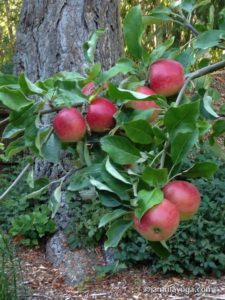 When we begin to experience this interconnectedness of life, we naturally honor, respect and serve all forms of life. This principle inspires and motivates the environmental and ‘green initiatives’ of Amma’s Ashram and her devotees around the world.
When we begin to experience this interconnectedness of life, we naturally honor, respect and serve all forms of life. This principle inspires and motivates the environmental and ‘green initiatives’ of Amma’s Ashram and her devotees around the world.
Planting hundreds of thousands of saplings a year, giving seminars on permaculture, bee keeping, ecological awareness, and seed saving projects are a few of the grassroots projects. For more information on Amma and her devotees’ projects check out Embracing the World, www.embracingtheworld.org.
Seeds of Life, Seeds of Healing
Amma suggests we grow vegetables. Many people have started small garden plots in their yards. Amma’s ashrams around the world are becoming resource centers for growing food. One of the most important requirements for a garden is good seeds. Farmers and gardeners of the past saved their own seeds. Today good seeds are harder to come by.
“Every seed we plant is a tiny loving prayer in action.”
Rowan White, founder of Sierra Seeds
A Living Tradition
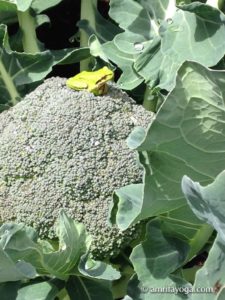 The world heritage of seed saving gave us the multitude of grains and vegetables we grow today. Farmers would select seeds from the most vigorous and healthy plants. They carefully chose plants for desired traits like productivity, flavor, and disease resistance.
The world heritage of seed saving gave us the multitude of grains and vegetables we grow today. Farmers would select seeds from the most vigorous and healthy plants. They carefully chose plants for desired traits like productivity, flavor, and disease resistance.
Neighbors often traded seeds, adding to the genetic diversity and strength of the plants. Over time, the plants adjusted to local soil, pests, diseases and climate. If a new disease came or the weather pattern changed, someone in the village likely had a variety that met the demand.
Cross-pollination of the survivors with other strains added new features to the genes of these plants. Plants and humans created a wide and varied gene pool – a shared insurance that some seeds would survive threats.
Migrating settlers brought their best seeds with them. Centuries later many of these varieties still thrive.
In this way, people all over the world bred resilient, open-pollinated seed strains. These seeds are a treasure house of varied genetic material – adopted and selected over generations for diverse wants and needs in every growing condition.
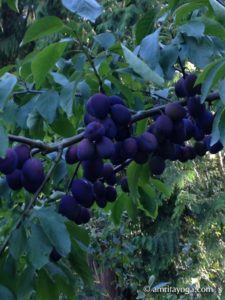 In our modern world of climate change and increasing pollution, seeds born of a time-tested gene pool may become the key to survival for future generations. Preserving this treasure house of adaptability is a global priority.
In our modern world of climate change and increasing pollution, seeds born of a time-tested gene pool may become the key to survival for future generations. Preserving this treasure house of adaptability is a global priority.
The Loss of Adaptable Seed Strains
In recent times, there is an unprecedented loss of seed varieties. During the past 60 years many traditional country markets and local grocery stores have been replaced by supermarket chains.
Crops are bred for storage and easy marketing rather than flavor, nutritional value and resiliency. Many small seed companies were swallowed up by larger seed-breeding facilities. These larger facilities could afford the research and specialized equipment to develop new strains for these new demands.
Many larger companies were taken over by multinationals whose primary interest was often manufacturing chemical fertilizers and pesticides. Strong and naturally resistant seed strains of the past were discarded, even outlawed in favor of mass profit motives and the monopoly of GMOs (Genetically Modified Organisms).
Corporations invested huge amounts of money in seed research and development. This produced F1 hybrid seeds, which are specially bred for specific characteristics. The first generation often displays a strong growth known as hybrid vigor.
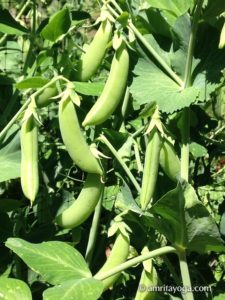 But the seeds are bred so they can’t produce the same standard of plants again when re-sown. Unlike traditional varieties, hybrid seeds lack the ability to adapt to changing conditions.
But the seeds are bred so they can’t produce the same standard of plants again when re-sown. Unlike traditional varieties, hybrid seeds lack the ability to adapt to changing conditions.
Commercial hybrid seeds often depend on chemical fertilizers and pesticides. Many hybrid seed varieties are patented, making it illegal to save seeds without permission or payment to the seed producer. Unfortunately, it is often only the hybridized varieties that are available in garden shops around the world.
Genetically modified seeds were introduced in 1994. These qualities are added for specific demands such as increased shelf life for shipping purposes.
GMO seed producers also promised greater harvests. The seeds are patented and it is illegal to save seed the next season. An increasing number of GMO crops are failing to fulfill their promises and show detrimental effects on health and the environment.
Studies have shown severe digestive and reproductive disorders on test animals when fed a diet of GMO corn and soy. Since 2005, reports have shown that Indian farmers whose sheep and cattle grazed on GMO cotton fields after harvest find their animals dying in large numbers.
There are also negative effects from the use of pesticides associated with GMO crops. In a small community in Campeche, Mexico, Mayan farmers found that 1,500 colonies of honeybees died from the fumigation of GMO corn crops in the area.
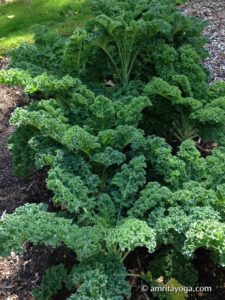 And when it comes to seed saving, GMO crops compromise the purity of seeds everywhere through unwanted cross-pollination.
And when it comes to seed saving, GMO crops compromise the purity of seeds everywhere through unwanted cross-pollination.
Hybrid and GMO seeds stand in stark contrast to traditional open-pollinated seeds that have been used by farmers for thousands of years. These seeds were bred for flavor, nutritional value, beauty, fragrance, dependability, diversity, and sustenance. Open-pollinated seed produces plants that are true-to-type. They carry their unique genetic signature for generations.
The Food and Agriculture Organization of the United Nations estimated that 75% of crop diversity was lost between 1900 and 2000. This is due to the diminishing use of traditional crops, massive consolidation of seed producers, and large-scale planting of genetically modified crops.
It is estimated that 90% of agricultural varieties are no longer available. Farmers and home growers are left with a rapidly diminishing seed pool to draw from. For example, India had nearly 110,000 varieties of rice until 1970. Now only 6,000 – about 5% – of these rice varieties survive.
This loss of our diverse genetic seed heritage endangers the world food supply and poses a great threat to the modern world.
Be Part Of The Solution
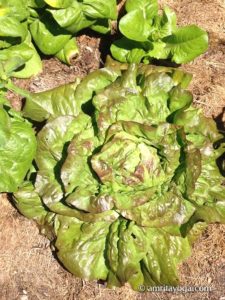 Home gardeners around the world have kept traditional vegetable varieties in cultivation. These seed savers are the guardians of a huge store of genetic diversity. They may have preserved the right genes for dealing with the challenges of our rapidly changing world – tolerance for drought and extreme weather, resistance to diseases, and more.
Home gardeners around the world have kept traditional vegetable varieties in cultivation. These seed savers are the guardians of a huge store of genetic diversity. They may have preserved the right genes for dealing with the challenges of our rapidly changing world – tolerance for drought and extreme weather, resistance to diseases, and more.
A garden that is self-reliant fosters a deep sense of satisfaction and independence. To see your seeds grow and mature into flowers and a new supply of seeds is to witness one of the simple miracles that sustains life. Participation in this process allows you to enter into the ancient, living cycles of Nature and Her continuous power of renewal. Seed-saving maintains an unbroken connection to something greater than ourselves.Seeds have and will always be vital to the culture of community. Through garden networks, seed swaps, gatherings and celebrations, heirloom seeds highlight the common bonds of people, food and place.
Natural seeds are integral to local food sustainability. Seed saving is a precious opportunity to step into the unbroken circle of one of the most enduring world traditions. It is also a necessity to secure our earth’s magnificent and precious biodiversity. Let us honor this vital responsibility and make an everlasting offering to the future generations of the world.
“Take care of the seeds and they will take care of you.”
Rowan White, founder of Sierra Seeds
Let’s Get Started!
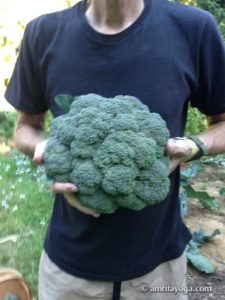 Do some research. If you haven’t saved seeds before, check out companies that sell heirloom open-pollinated seeds online (several are listed in the resource section). Most will send you a free catalog. Check out local seed companies. Talk to neighbors and friends who save seeds. Get some good seeds. Pick out a few vegetables or flowers whose seeds you would like to save
Do some research. If you haven’t saved seeds before, check out companies that sell heirloom open-pollinated seeds online (several are listed in the resource section). Most will send you a free catalog. Check out local seed companies. Talk to neighbors and friends who save seeds. Get some good seeds. Pick out a few vegetables or flowers whose seeds you would like to save
Books:
Breed Your Own Vegetable Varieties: The Gardener’s and Farmer’s Guide to Plant Breeding and Seed Saving, 2nd ed. Deppe, Carol. (2000). Chelsea Green Publishing. A thorough, readable book detailing all aspects of seed selection and breeding techniques for creating your own new varieties.
The Resilient Gardener: Food Production and Self-Reliance in Uncertain Times. Deppe, Carol. (2010). Chelsea Green Publishing. Great info for any gardener in uncertain times!
Lets Grow Seeds. Green Friends. (2014). Mata Amritanandamayi Mission Trust. Simple guide to saving seeds, lots of pictures!
Braiding Sweetgrass, Indigenous Wisdom, Scientific Knowledge, and the Teachings of Plants. Kimmerer, Robin Wall. (2013). Milkweed Editions. Fantastic book weaving botany, ecology and indigenous wisdom in a world view honoring all of life grounded in reciprocity and gratitude.
Seed: The Untold Story. Seed reveals the story of passionate seed keepers around the world as many irreplaceable seeds near extinction. Great interviews. Available to rent on Amazon.
Heirloom Seeds:
Here are a few places mostly on the West Coast of the USA to get heirloom seeds (best is organic, open pollinated seeds). These sites are inspiring and have great online resources for all things gardening including lots of seed saving info.
Adaptive Seeds. https://www.adaptiveseeds.com/ Pacific Northwest grown, open pollinated, organic seeds.
Baker Creek Heirloom Seeds. http://www.rareseeds.com/ Baker Creek has probably the most beautiful seed catalogue around – one is free and the big one – The Whole Seed Catalogue – costs a bit and is filled with lots of fun info. Located in California.
Seed Savers Exchange. http://www.seedsavers.org/ Preeminent USA seed saving organization, whose members share over 1,000 heirloom varieties of vegetables, fruits and grains. Probably the greatest single heirloom seed-saving resource. Great seeds, great resource. Become a member!
Fedco Seeds. https://www.fedcoseeds.com/ Large selection of certified organic cultivars and regional heirloom varieties located in Maine.
Bountiful Gardens. www.bountifulgardens.org. Resource for good-performing heirloom, untreated open-pollinated seeds located in California.
Sierra Seeds. www.sierraseeds.org Small seed company that provides regionally-adapted seeds of the Sierra Foothills, as well as programs that empower seed stewards and local farmers. Founded by Rowan White, an Indigenous seed steward of the Mohawk and Haudenosaunee. Sierra Seeds is infused with the wisdom of her indigenous ancestors. She says on the site: “These seeds, these tiny capsules of life and witnesses to the past, they speak to me in my dreams.” The site takes you into the beauty of connecting on a deeper level with all things seeds.
Uprising Seeds. https://uprisingorganics.com/ All seeds are certified organic, open pollinated and grown by small family farms in the Pacific Northwest. Local!
Check your local co-op, garden stores, etc. for more heirloom and Native seeds companies. Port Townsend, WA now has about 3 small local seed companies! Trade with your friends and neighbors!
Saving Seeds:
Here are two free online sites with seed saving info. Most of the seed companies listed above and the Organic Seed Alliance also have seed saving info.
Seed Savers. http://www.seedsavers.org/learn
Vegetable Seed Saving Handbook http://howtosaveseeds.com/index.php
Advocacy:
Organic Seed Alliance A local (Port Townsend, WA) non-profit that advances ethical seed solutions through research, education, and advocacy programs. Doing great work with local farmers and advocacy work nationally. They have a free Seed Saving Guide for Gardeners and Farmers that you can download.

0 Comments